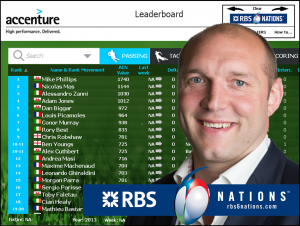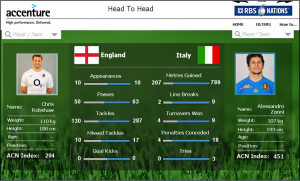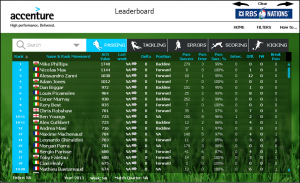 Earlier this week I attended a fascinating insight given by the Accenture analytics team and former England rugby player and now BT Sports Rugby Expert Ben Kay on how the individual performance of a player is capable of being improved through the use of cutting-edge technology and sophisticated algorithms that give ‘real-time’ feedback whilst the game is in progress.
Earlier this week I attended a fascinating insight given by the Accenture analytics team and former England rugby player and now BT Sports Rugby Expert Ben Kay on how the individual performance of a player is capable of being improved through the use of cutting-edge technology and sophisticated algorithms that give ‘real-time’ feedback whilst the game is in progress.
Accenture is the ‘Official Technology Partner’ for the RBS 6 Nations Rugby Championships (2014-17) and the sports sponsorship is something of a shop window for the world’s largest management and technology consultancy. The tournament itself is one of the premier events in the sporting calendar with 15 individual matches played in Cardiff, Dublin, Edinburgh, London, Paris and Rome February – March 2014.
Accenture provides detailed statistics to its partners and a cut-down version for rugby fans in the form of a mobile app.
The underlying data is the same for both audiences and consists of hundreds of rows of information provided by OptaSports – one row for every action on the pitch – including x,y coordinates and the identities of players involved.
The way in which rugby fans interact with the sport is also changing and supporters increasingly use their mobiles and social media to follow the games and to get involved with the conversation 24/7 rather than spend hours drinking in front of widescreens in pubs although of course rugby fans are known to like a drink!
 For 2014, Accenture has enhanced the official mobile app with the fans’ needs in mind by providing improved audience participation and interaction with the Championships that includes a Twitter feed. The mobile app provides access to news updates, video highlights and up-to-the-minute scores and commentary throughout the Championships, giving fans a real second screen experience that compliments the TV coverage. Early trials of the technology were highly successful and resulted in over 759,000 downloads in the 2013 Season, making it the number one sports app in the iTunes store for the UK and Ireland. Today, rugby fans can download the mobile app on the iPhone, Android and Kindle Fire, and it’s also available across the 6 Nations in English, French and Italian.
For 2014, Accenture has enhanced the official mobile app with the fans’ needs in mind by providing improved audience participation and interaction with the Championships that includes a Twitter feed. The mobile app provides access to news updates, video highlights and up-to-the-minute scores and commentary throughout the Championships, giving fans a real second screen experience that compliments the TV coverage. Early trials of the technology were highly successful and resulted in over 759,000 downloads in the 2013 Season, making it the number one sports app in the iTunes store for the UK and Ireland. Today, rugby fans can download the mobile app on the iPhone, Android and Kindle Fire, and it’s also available across the 6 Nations in English, French and Italian.
It seems that technology is helping to re-write the way in which rugby is coached and played, according to Ben Kay.
“Rugby players now wear GPS units sewn into their rugby shirts that allow the bench to monitor their performance including their heart rate at crucial moments in the game, such as when they go to take a drop kick. And heart rate monitors attached to players now check to see how they perform under pressure as well as measure the G-force impact of collisions on the pitch that can be as much as 10G,” he says.
Ouch!
Key performance indicators include “momentum scores” – an important factor in why one team beats another even when the players are evenly matched and “positional battle scores” that compare the relative performance of individual players in opposing teams.
Over the two month tournament a team of Accenture analysts will be buried deep in the basement of Accenture HQ at Plantation Place in the City pouring over algorithms based on observed statistical relationships to produce a score for every player that shows how well they are playing.
 The algorithm combines weighted values for every action – positive scores for metres gained, passes and so on, negative for poor handling or a missed tackle – and calculates an overall score, with a few tweaks here and there. This analysis is the transmitted with a sixty-second lag behind what the fans are watching on the pitch so it’s as close to real-time as you can get.
The algorithm combines weighted values for every action – positive scores for metres gained, passes and so on, negative for poor handling or a missed tackle – and calculates an overall score, with a few tweaks here and there. This analysis is the transmitted with a sixty-second lag behind what the fans are watching on the pitch so it’s as close to real-time as you can get.
The weightings are based on prior calculations of an action’s likelihood of leading to a point scoring opportunity, while the human side arises where a particular action – say, kicking a penalty – would give a player a disproportionate score advantage over his teammates who provided him with the opportunity.
One observation to have come out of the analysis carried out by Accenture is that although the All Blacks tend to have less possession of the ball during a game, they tend to do much more with it because they choose their opportunities more carefully and execute well and as a result are much more strategic than some of their competitors, including England.
The boffins at Accenture accepted that there’s still more work required in order to be able to assess the performance of a whole team and to predict whether a particular team on the day is statistically more likely to win and what the score will be.
Then again, isn’t that what spread betting is all about?
Ardi Kolah was Chief Press Officer at Andersen Consulting (1992-94).














Recent Comments